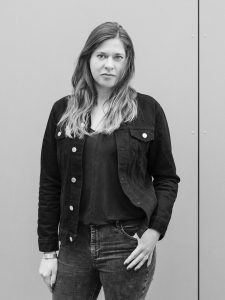Svenja Hönig

Shortbio
- 2016-2021 Wissenschaftliche Mitarbeiterin am Kompetenzzentrum für Denkmalwissenschaften und Denkmaltechnologien, Arbeitsbereich Denkmalpflege, Otto-Friedrich-Universität Bamberg
- 2014–2016 Studium der Denkmalpflege, Otto-Friedrich-Universität Bamberg
- 2010–2014 Studium der Kunstgeschichte und Philologie Französisch, Ruhr-Universität Bochum
Contact
Bauhaus-Universität Weimar
Fakultät Architektur und Urbanistik
DFG-Graduiertenkolleg 2227 „Identität und Erbe“
D-99421 Weimar
Sitz: Prellerhaus | 3. OG | Raum 303
Geschwister-Scholl-Str. 6 | D-99423 Weimar
svenja.hoenig[at]uni-weimar.de
Emotion and built heritage (working title)
The German tradition of heritage conservation and its research has a long history of ‘objective’ recording and evaluation of built objects. This tradition is linked to the process of “scientification” in the 19th and 20th centuries, which transferred the premises of the natural sciences to the humanities. A development that is synonymous with the manifestation of a contrastive understanding of emotion and cognition. Emotion and subjectivity have subsequently been excluded in great parts from scientific considerations, hence also from heritage research.
Current efforts in the humanities, on the other hand, show that negotiating a heritage of the past always involves subjective evaluations, emotions, and attributions of value. Thus, for example Postcolonial Studies or the Critical Heritage Studies engage in these questions.
Even if the relevance of scientific approaches that include emotion in their consideration is increasingly recognized, the challenge remains to make the phenomenon of emotion concretely tangible: What can emotion mean in the sphere of built heritage? How can it be manageable as a dimension for a theoretical approach to heritage?
In my dissertation, I therefore investigate the role of emotion for and in the sphere of built heritage. The interest of my work lies in showing how built heritage, its stakeholders and their motivations are to be understood and evaluated in the interplay of ‘objectively measurable’ elements and emotional factors. In the interaction of these two sides, heritage must constantly re-locate itself and is understood as a social process of negotiation.
Publications
- Hönig, Svenja: A Sense of Harlem. Städtebauliche Denkmalpflege und Erbe als Symbolraum in New York City. In: Arbeitskreis Theorie und Lehre der Denkmalpflege e.V. (Hg.): denkmal:emotion. mobilisierung. bindung. verführung. (Publikation zur Jahrestagung 01. – 03.10.2020, Bamberg), erscheint 2021.
- Hönig, Svenja: New York Murals. Aneignung und Inszenierung von Stadträumen. In: Blokker, Johanna; Enss, Carmen; Herold, Stephanie (Hg.): Politiken des Erbens in urbanen Räumen, Bielefeld 2021, S. 117–130.
- Hönig, Svenja: Neue Kompetenzen auf bewährtem Fundament – Das KDWT und der Masterstudiengang Denkmalpflege in Bamberg. In: Vereinigung der Landesdenkmalpfleger (Hg.): Europäisches Kulturerbejahr (ECHY) 2018 –Erinnerung und Aufbruch, VDL-Jahrestagung in Trier, 10. –13. Juni 2018, erscheint 2021.
- Hönig, Svenja; Stackmann, Sophie: [W]Ort der lebendigen Geschichte. Die sprachliche Produktion von Erbe am Beispiel des POLIN-Museums in Warschau. In: Franz, Ute (Hg.): Forschende Frauen 2019, Beiträge Bamberger Nachwuchswissenschaftlerinnen, 11, Bamberg 2020, S. 73-102.
- Hönig, Svenja: Das atmosphärische Ensemble. Bauliche Objektgruppe oder stimmungshafte Erscheinung? In: archimaera # 8: ATMOSPHÄREN, Heft 8, 2019, S. 49-63.